So you decided your life lacks a young puppy with bat ears, huh? Welcome to the Frenchie world!
You’re in for a ride filled with mischievous pups rocking their large personalities.
But as you watch your new puppy grow, you’ll undoubtedly have questions about their development.
Understanding the French Bulldog growth chart will help ensure your furry friend is on the right track to becoming a happy, healthy adult.
Let’s dive into everything you need about French Bulldog growth, from weight gain to their full adult size.
French Bulldog Growth Chart

Tracking your French Bulldog’s growth is essential to ensure they develop healthily and reach their full potential.
Below is a growth chart that provides a general idea of the weight and height you can expect as your Frenchie grows from a tiny pup to a sturdy adult.
Remember, these are average figures, and individual growth can vary.
The following numbers, provided in the charts, were sourced from the American Kennel Club (AKC) breed standard for these friendly dogs.
French Bulldog Weight Chart
| Age | Weight (lbs) | Weight (kg) |
|---|---|---|
| 1 month | 4 – 7 lbs | 1.8 – 3.2 kg |
| 2 months | 9 – 12 lbs | 4.1 – 5.4 kg |
| 3 months | 10 – 14 lbs | 4.5 – 6.4 kg |
| 6 months | 16 – 20 lbs | 7.3 – 9.1 kg |
| 8 months | 18 – 24 lbs | 8.2 – 10.9 kg |
| 12 months | 20 – 28 lbs | 9.1 – 12.7 kg |
| 18 months | 20 – 28 lbs | 9.1 – 12.7 kg |
French Bulldog Height Chart
Besides weight tracking, height changes are equally important when dealing with French Bulldogs.
This French Bulldog height chart represents how tall they become from puppies until adulthood.
During the 12 to 14-month-old period, most reach maximum heights of about 11-13 inches tall measured at shoulder level.
| Age | Height (inches) | Height (cm) |
|---|---|---|
| 1 month | 2 – 4 inches | 5 – 10 cm |
| 2 months | 4 – 6 inches | 10 – 15 cm |
| 3 months | 5 – 7 inches | 13 – 18 cm |
| 6 months | 7 – 9 inches | 18 – 23 cm |
| 8 months | 9 – 11 inches | 23 – 28 cm |
| 12 months | 11 – 13 inches | 28 – 33 cm |
| 18 months | 11 – 13 inches | 28 – 33 cm |
Understanding your French Bulldog’s height helps ensure they are growing proportionately.
Deviations from the standard could imply medical conditions or impaired progress.
Regularly measuring your dog’s height can provide valuable insights into its growth patterns.
Puppy Growth Timeline
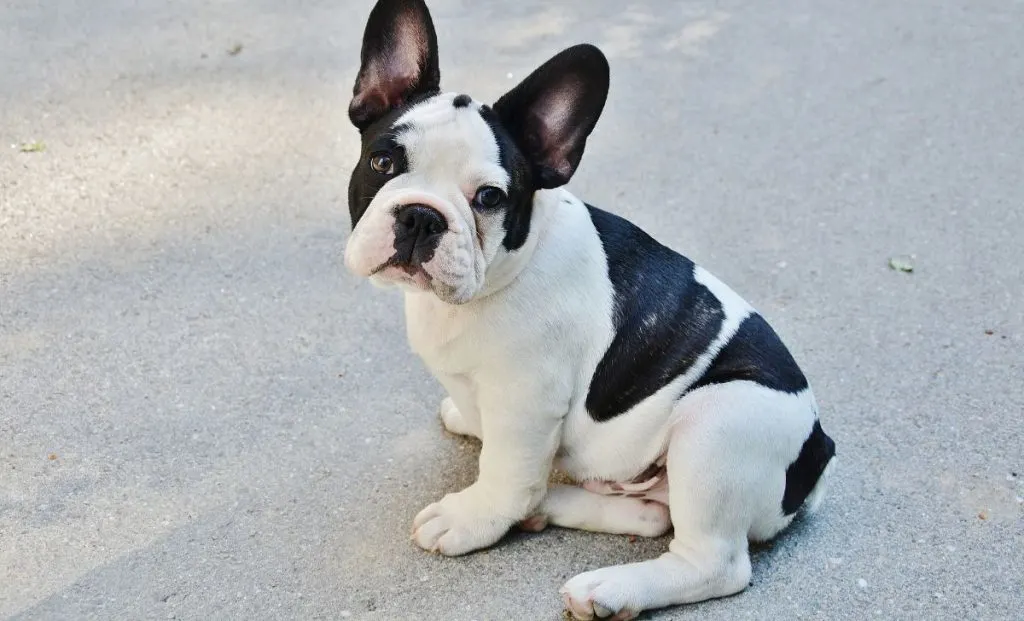
These happy dogs are known for their stocky build, short nose, and irresistible charm.
Tracking their growth involves understanding their weight gain, average weight at various stages, and the impact of multiple factors on their development.
Every phase is characterized by hardships and happiness, from being a naughty little puppy to an older, more composed dog.
First Weeks Of Age
When French Bulldog pups are just born, they are tiny and adorable, weighing just a few ounces.
During the first few weeks of life, they undergo rapid growth, which can be fascinating and alarming for new owners.
By the time they reach eight weeks of age, they typically weigh between 5 and 7 pounds. This early stage is crucial as it sets the foundation for their overall growth trajectory.
Young puppies, especially those in bigger litter, may exhibit some variation in size.
Environmental factors, such as the quality of their diet and the care provided, play a significant role in these initial weeks.
Proper nutrition and a balanced diet of essential nutrients support their rapid growth. And for all you new puppy owners, check out seven tips and tricks to stop a puppy from crying.
From 8 Weeks To 6 Months
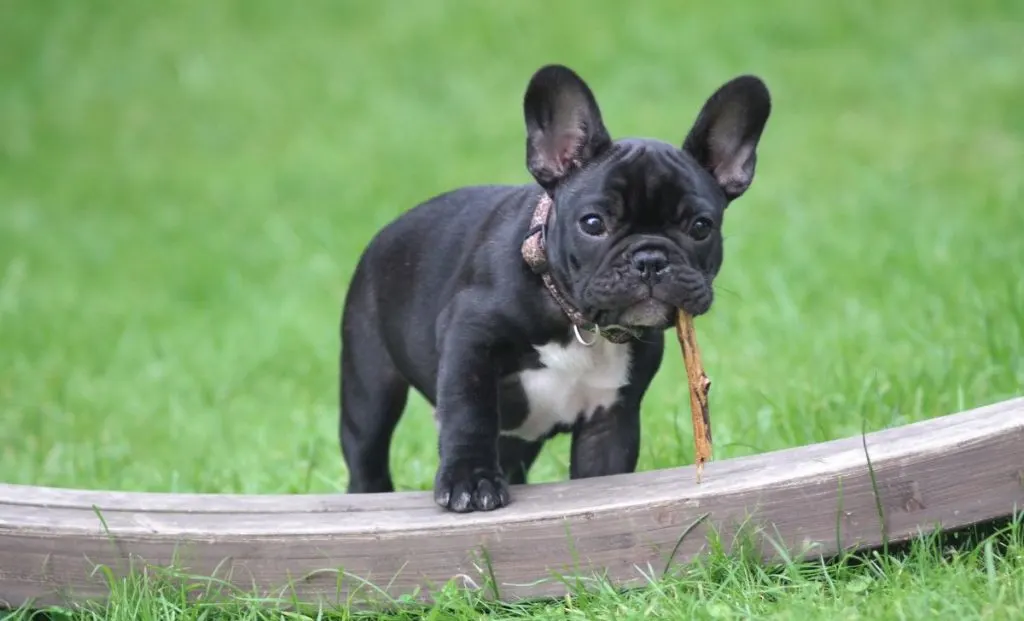
Your French Bulldog will change a lot between eight weeks and six months.
This stage is characterized by the rapid growth of the adorable pups and their significant weight gain.
Typically, French Bulldog puppies weigh around 9 to 12 pounds at about three months old. This is a critical time when their skeletal system, muscles, and overall body develop quickly.
You will see your puppy’s playful and mischievous side emerge more often at this age range.
Regular visits to the vet are essential so that their development can be tracked and ensure they are hitting all milestones accordingly.
By six months old, French bulldogs usually weigh between 15 and 20 lbs, but small differences may exist between pups.
At this point, it is important to concentrate on basic training and socialization and create routines for them.
Six Months To One Year
The rate at which your French Bulldog grows will decrease as it approaches one year old.
They should have achieved most of their adult height by now and put on a good percentage of what would be considered full-grown weight.
Typically, a one-year-old French Bulldog weighs between 16 and 28 pounds; males are generally heavier than females due to their larger frames and muscle mass.
Around this time, baby teeth fall out and are replaced with permanent ones, so you might notice extra chewing.
Provide appropriate chew toys during this phase so they do not destroy furniture. And if you ever wondered why dogs like squeaky toys, we got you covered!
When they enter adolescence, many Frenchies push boundaries through independent acts.
Continue with consistent training and socialization to reinforce good behavior.
This stage is crucial for solidifying the habits and behaviors you want to see in adulthood.
Reaching Adult Weight And Height

Once your French Bulldog reaches adulthood, their growth will stabilize. French Bulldogs reach their full size between eighteen months and two years.
When fully grown, an adult Frenchie typically weighs from 20 to 28 pounds, depending on whether it is a male or female (some larger males may tip the scales slightly higher).
Shoulder height ranges from eleven to thirteen inches, giving them that stocky, muscular look we love about them!
These are just rough figures; please remember that every dog is different, and these numbers can vary greatly depending on genetic factors, diet, and overall health.
Focus on maintaining their health through a balanced diet, regular exercise, and routine veterinary care. Adult French Bulldogs are typically more settled and make excellent companions.
Regular vet checkups will keep track of weight gain, ensuring they stay within a healthy range.
Senior Years
As your French Bulldog enters its senior years, it may require adjustments to its diet and exercise routine.
Senior dogs often need lower-calorie diets to prevent weight gain and joint supplements to support mobility.
Regular vet visits have become even more important in monitoring their health and addressing age-related issues like arthritis.
Factors Influencing Growth And Development

Many factors can impact how big your French Bulldog gets or what he looks like.
Understanding these can help you provide the best care for your new puppy and address potential problems early on.
Genetic Factors
Genes play a big part in determining the size and weight of dogs.
Looking at parents’ sizes will give a general idea of what to expect. However, there’s always room for surprises, too!
Some pups might naturally be bigger or smaller due to genetic makeup alone; breeders must provide information regarding lineage, which could help predict adult size more accurately than other methods.
Let’s dive into the genetic soup that makes your Frenchie the lovable, quirky little powerhouse they are. Imagine genetics as the master chef in the kitchen, whipping up a French Bulldog with a pinch of this and a dash of that.
It’s all written in their DNA, from their adorably squished faces to their robust little bodies.
Mom and Dad’s Genes
First off, let’s talk about the parents. Like how you might have inherited your dad’s knack for telling bad jokes or your mom’s love for chocolate, your Frenchie inherited traits from their parents.
If mom and dad were on the larger side of the Frenchie spectrum, chances are your pup will be, too.
It’s like getting the family heirloom of good looks and that solid Frenchie physique.
The Squish Factor
Then there’s the famous Frenchie face – that endearing squished nose and those big, round eyes.
This look results from generations of breeding for that signature “bat-eared charm.”
While this gives them their unique appearance, their growth might differ slightly from other breeds. They tend to have compact, muscular builds that make them feel like little bricks of joy.
Growth Spurts Galore

Just like teenagers, Frenchies can go through growth spurts.
One minute, they’re small enough to fit in your lap, and the next, they’ve filled out into a sturdy little companion. These spurts are heavily influenced by their genetic blueprint.
Some might grow steadily, while others will have those “wow, you’ve grown!” moments seemingly overnight.
Tiny Yet Mighty
Don’t let their small size fool you – Frenchies have a lot of heart and muscle packed into their bodies.
Despite their compact frame, their genetics ensure they develop into strong, agile dogs. It’s like having a mini bodybuilder who loves cuddles more than lifting weights.
Diet And Nutrition
What you feed your pup greatly affects his overall development, so ensure a healthy diet!
Excellent nutrition helps meet energy needs during growth periods while supporting overall well-being.
Puppies need plenty of protein, fat, vitamins, minerals, etc., all necessary for their rapidly growing bodies. As adults, these requirements change, so foods should be adjusted accordingly.
Different foods can impact your French Bulldog’s weight and health. High-quality commercial dog food formulated for French Bulldogs can provide balanced nutrition.
Furthermore, if possible, fresh whole foods such as lean meats, vegetables, and fruits should be included in the mix since they add a variety of flavors that enhance palatability.
Exercise And Activity
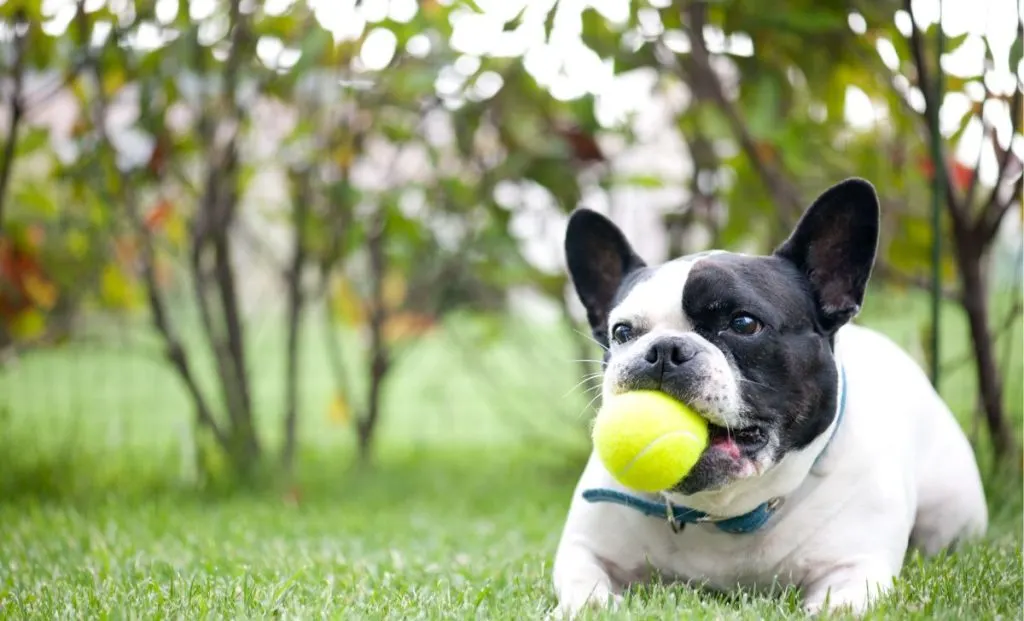
Your French Bulldog needs daily exercises not only for its physical health but also for mental well-being.
French Bulldogs are small in size, but they are energetic pups that need regular exercise and playtime.
Brisk walks, fetch, and interactive games are some activities that keep them fit, prevent behavior problems, and help them maintain a healthy weight.
Health And Medical Care
Frequent visits to the veterinary clinic are necessary if you want to monitor your French Bulldog’s growth and overall health status.
Vaccinations, parasite control measures, and routine checkups should be performed to prevent diseases that may affect their development.
Should there be significant variations from what is expected on the growth chart, contact your veterinarian immediately to rule out potential underlying health problems.
Environmental Factors
The environment in which your French Bulldog grows may also affect its growth patterns.
Creating a secure, clean, and stimulating place will help promote the healthy development stages of this pet breed.
Socializing with other dogs and exposing them to different people and places can make them more confident and adaptable.
Addressing Common Growth Concerns
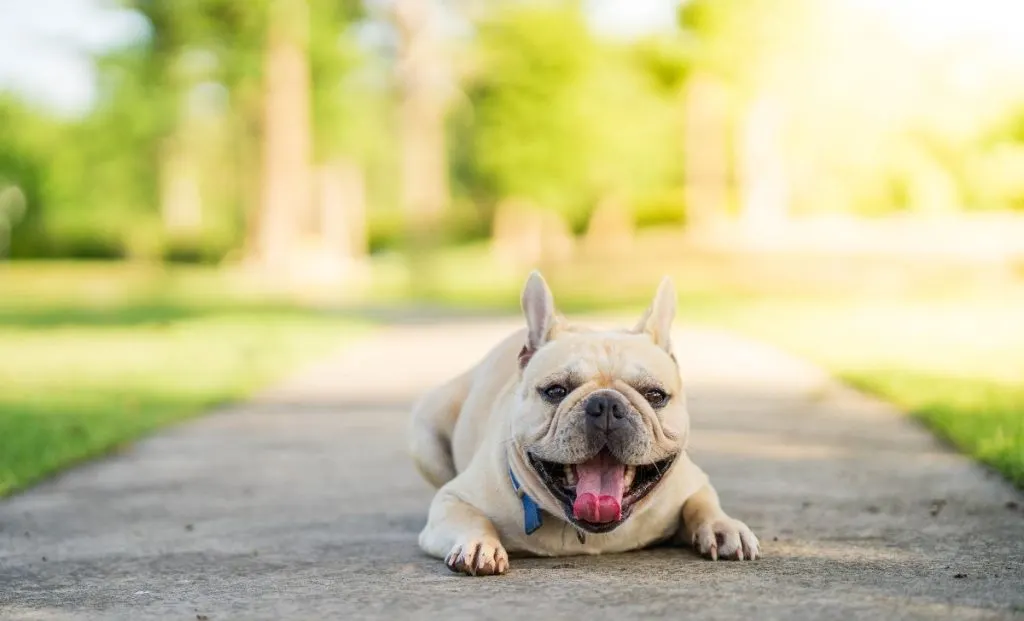
Sometimes, while raising our little friends, we might come across certain issues related to their physical development.
Addressing these early can help ensure your puppy develops into a healthy and happy dog.
Weight Difference And Variability
It should not be surprising that different puppies within the same breed will have varying weights.
Litter size, diets, and exercise levels might all contribute to this variation. However, consult your vet for guidance if your puppy’s weight gain seems too slow or too fast.
They can advise whether it falls within healthy ranges and suggest changes in feeding patterns or exercises.
Is My Frenchie Too Chubby?
French Bulldogs are supposed to be stocky, but there’s a fine line between solid muscle and extra fluff.
If your Frenchie is starting to look like they’re auditioning for the Stay Puft Marshmallow Man role, it might be time to evaluate their diet and exercise routine.
Remember, those pleading eyes are professionals at begging for extra treats. Stay strong and keep their diet balanced. And hey, more walks mean more adventures for both of you!
My Frenchie Is A Featherweight
On the flip side, if your Frenchie seems too light, like a strong gust of wind could blow them away, it’s time to beef up that diet.
Ensure they’re getting enough of the right nutrients to grow into the robust little dynamo they’re meant to be.
Sometimes, it’s just a matter of adding a bit more protein or finding a more calorie-dense food. And, of course, check in with your vet – they’re like the personal trainer for your pup.
Potential Problems And How to Manage Them

French Bulldogs are unique due to their body structure; hence, they have several health complications associated with genetics. Some examples include:
- Respiratory Issues: French Bulldogs experience breathing difficulties because they have short noses. Therefore, they should avoid strenuous activities during hot weather conditions and monitor their breath rates when exercising.
- Joint Disorders: These dogs tend to develop joint problems, mainly caused by their compact build. Administering joint supplements and managing their ideal weight could help relieve such issues.
- Skin Allergies: This breed is susceptible to skin allergies, so ensure you groom the pup regularly using hypoallergenic products to manage such conditions properly.
Training And Exercise Needs
It is important to train your French Bulldog from an early age for its well-being.
These clever animals respond well to positive reinforcement methods like treats and praise.
Basic obedience lessons foster a strong relationship while guaranteeing that the French Bulldog grows into a polite pet.
Additionally, daily exercise is crucial for keeping your French Bulldog happy and healthy.
Although they have small bodies, these dogs are highly energetic; hence, they love brisk walks or interactive plays such as fetch.
Regular exercise helps in weight management and prevents boredom, thus promoting the dog’s overall happiness.
Key Takeaways For French Bulldog Owners
Caring for a French Bulldog involves understanding their unique growth patterns and requirements.
Here are some key takeaways to remember so that you ensure your French Bulldog grows into a healthy adult dog:
- Monitor Growth: Regularly check your French Bulldog’s weight and height against the growth chart to ensure they are developing appropriately.
- Provide Excellent Nutrition: Provide puppies with balanced diets that contain all the nutrients needed during development stages, such as minerals and vitamins.
- Exercise and Play: Engage in daily exercise and playtime to keep your French Bulldog physically and mentally stimulated.
- Regular Vet Visits: We should make sure that we take our furry friends for medical checkups occasionally. Prevention is always better than cure when dealing with diseases, and early detection saves lives.
- Socialization and Training: To develop into a well-adjusted and well-behaved adult dog, focus on early socialization and consistent training with your growing puppy.
To Sum It All Up
Raising a French Bulldog is a rewarding experience filled with love, laughter, and a few challenges.
Understanding the growth chart and providing proper care ensures your French Bulldog grows into a healthy, happy adult.
Embrace the journey, enjoy the puppy cuddles, and look forward to many wonderful years with your French Bulldog companion.
Good luck!
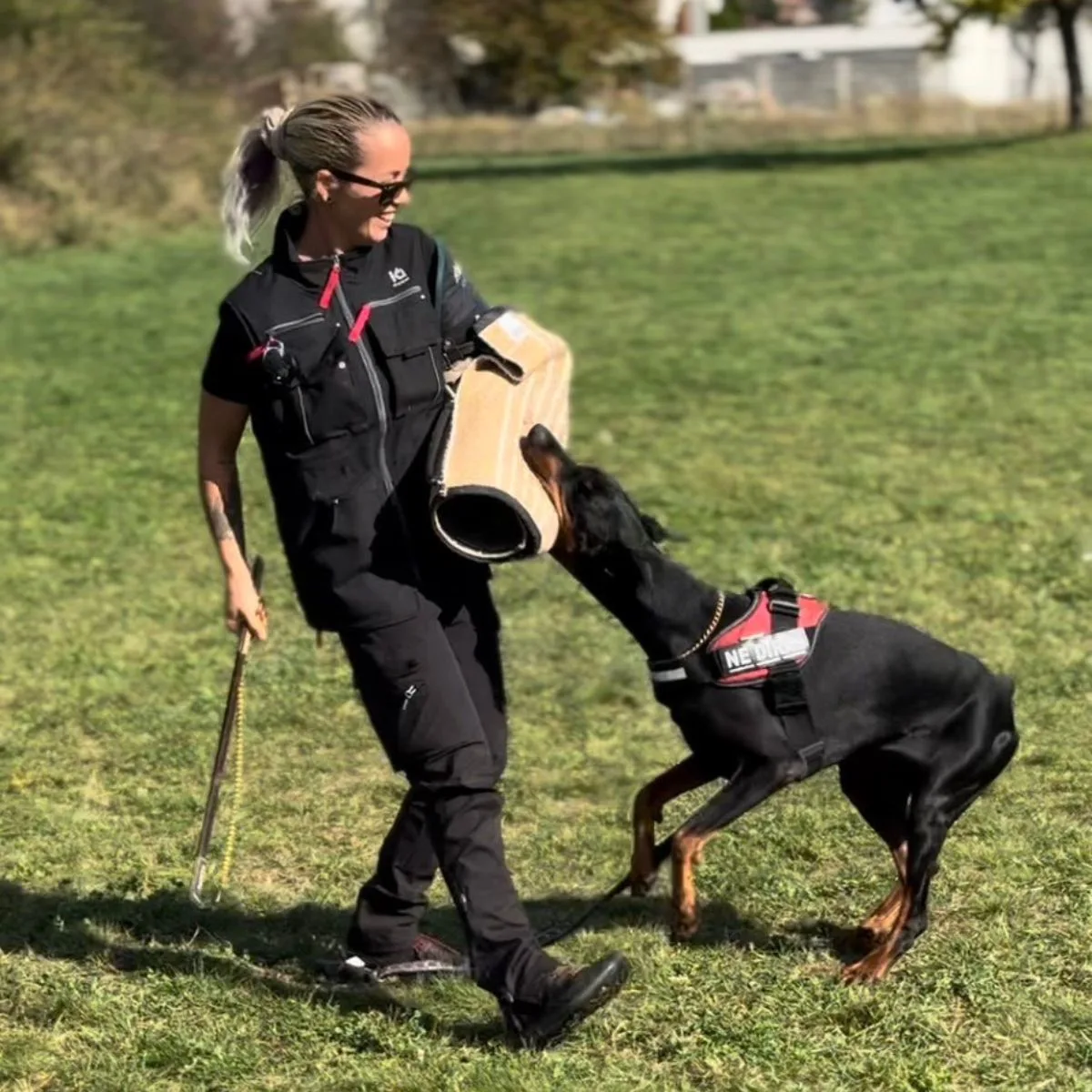
Nandina has been a lifelong dog owner and enthusiast. She shared her home with multiple breeds, including Giant Schnauzers, Cane Corsos, and Huskies. Currently, she is raising a three-year-old rescue and a working-line German Shepherd puppy.
Actively engaged in IGP dog sports for two years, Nandina is a certified instructor for basic obedience and socialization. She works as a trainer in her local dog sports club, and in her spare time, she handicrafts biothane gear for dogs.
